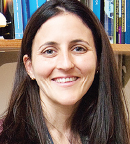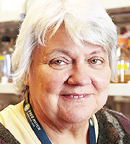
Rachel A. Freedman, MD, MPH

“Treatment patterns in older patients are highly variable, with undertreatment, overtreatment, and nonstandard treatment all frequently observed.”— Rachel A. Freedman, MD, MPH (left), and Arti Hurria, MD
Tweet this quote
As the U.S. population ages,1 the number of older women with breast cancer will increase,2 as well as the number of patients with frailty and other comorbid medical conditions. These patients are at increased risk for toxicity and functional decline during their breast cancer treatment course.
Despite increasing awareness of the needs of this growing population of patients, we still lack robust, prospective data on how to optimally select and support patients during treatment, maximize quality of life, prevent functional decline, and expedite recovery once the active treatments are completed.
We have seen some successes in answering focused questions regarding the treatment of lower-risk, hormone receptor–positive cancers, such as the ability to omit radiation,3 nodal surgery,4-6 and even breast surgery itself7; however, data to support standard practice in other tumor subtypes and in those with an increased risk for recurrence remain limited. Consequently, treatment patterns in older patients are highly variable, with undertreatment, overtreatment, and nonstandard treatment all frequently observed.8-16 Furthermore, although breast cancer is often considered more “favorable” when diagnosed at an older age, breast cancer–specific mortality is higher for those in the oldest age groups,17 with 47% of all breast cancer deaths occurring in women aged 70 and older.18

Stuart M. Lichtman, MD
Guest Editor
Geriatrics for the Oncologist is guest edited by Stuart M. Lichtman, MD, and developed in collaboration with the International Society of Geriatric Oncology (SIOG). Dr. Lichtman is an Attending Physician at Memorial Sloan Kettering Cancer Center, Commack, New York, and Professor of Medicine at Weill Cornell Medical College, New York. He is also President of SIOG. For more information about geriatric oncology, visit www.siog.org and the ASCO Geriatric Oncology website (www.asco.org/practice-guidelines/cancer-care-initiatives/geriatric-oncology/geriatric-oncology-resources).Given the increased risk for poorer outcomes for older patients, a concerted effort needs to be made on studying therapeutic options in this patient population. Two randomized trials dedicated to older patients with breast cancer have explored the potential for a lower-intensity treatment option with adjuvant capecitabine as an alternative to standard chemotherapy19 or bisphosphonate therapy alone20 (both demonstrating that capecitabine was not a viable treatment option in this setting). Although these trials did not result in a change of practice, they demonstrated the ability to successfully accrue patients to dedicated trials for older adults and are a model for future design.
Another important focus of research in older patients with cancer has been the development of tools to predict toxicity in those receiving chemotherapy, with prospective cohort studies21,22 showing the feasibility and validation of such strategies. An ongoing study (ClinicalTrials.gov identifier NCT01472094) will work to further validate this toxicity prediction model in older adults with breast cancer, in the hope that this tool will be able to facilitate risk assessment, identify areas of vulnerability, and inform potential interventions.
Update on Clinical Trial Enrollment
In the February 1, 2017, issue of the Journal of Clinical Oncology, we reported the results from a review of enrollment to systemic therapy clinical trials for breast cancer from 1985 to 2012 and examined trends in the accrual of older patients to adjuvant, neoadjuvant, and metastatic therapeutic trials separately during this period.23 Overall, 17% of enrolled patients were aged 65 or older and 9% were aged 70 or older. When categorized by trial setting, 15%, 24%, and 24% of participants on adjuvant, neoadjuvant, and metastatic trials were aged ≥ 65, whereas 7%, 15%, and 13% of enrolled patients were aged ≥ 70, respectively. Although we saw small improvements in enrollment of older patients to adjuvant trials over time, we also observed significant decreases in accrual for neoadjuvant and metastatic trials. Overall, accrual of older patients was relatively stagnant over time despite more attention to this challenge in recent years.
The urgent need for this research has been highlighted by ASCO24 and the Institute of Medicine.25 In addition, strategies for designing clinical trials in older and/or frail adults was described in a white paper summarizing the proceedings from a U13 conference held in collaboration with the Cancer and Aging Research Group, National Institute on Aging, and the National Cancer Institute.26 There is an urgent need for prospective data to guide care in this growing patient population, and we invite individuals to join the field of geriatric oncology and implement novel research strategies to meaningfully improve the evidence base.
The Cancer in Elderly Committee of the Alliance for Clinical Trials in Oncology is now in the process of surveying Alliance members on policy changes that might be effective. They plan to compile these data soon and present members’ opinions to Alliance leadership. Multiple policy changes, which include trying to prioritize accrual and perhaps even mandating expansion/extension of trials with inclusion of older adults, thus promoting funding of trials for older patients, have been proposed. ■
Disclosure: Drs. Freedman and Hurria reported no conflicts of interest.
References
1. U.S. Census Bureau: Available at http://www.census.gov/. Accessed May 17, 2017.
18. American Cancer Society: Breast Cancer Facts & Figures 2015-2016. Available at http://www.cancer.org/acs/groups/content/@research/documents/document/acspc-046381.pdf. Accessed May 17, 2017.
23. Freedman RA, Foster JC, Seisler DK, et al: Accrual of older patients with breast cancer to Alliance systemic therapy trials over time: Protocol A151527. J Clin Oncol 35:421-431, 2017.


